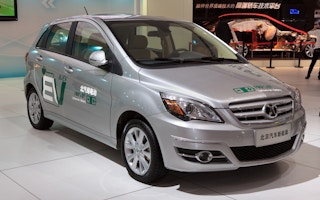The Chinese state-run research center in charge of helping the government draft automotive policy said it recommended that electric-vehicle manufacturing be opened to companies other than carmakers.
The China Automotive Technology and Research Center has drafted the policy changes and proposed the issuance of two to three special licenses for EV manufacturing, Wang Cheng, who oversees the project at the center, said in an interview. The recommendations will be circulated among industry regulators for discussion before submission to the State Council, with approval expected as soon as this year, he said.
Such changes would pave the way for the likes of Wanxiang Group Corp, the Chinese auto-parts maker that owns Fisker Automotive, to build cars in the country and challenge Tesla Motors Inc and BYD Co. China is promoting electric cars to reduce the nation’s reliance on fuel imports and ease air pollution, though sales have lagged behind government targets.
“Production licenses are hard to come by when China is trying to consolidate the industry,” said Steve Man, Hong Kong-based Asia automotive analyst at Bloomberg Industries. “This is a chance for China to take a global lead in EVs and transform itself into a technology leader in a mature auto industry that has traditionally been led by the West and its neighbors to the east.”
Wang, who spoke yesterday in Beijing, is deputy director at the Automotive Industry Development Institute within Catarc, which was set up by the central government in 1985 as the official research body to study and formulate automotive industry policy. Catarc is a unit of the state-assets regulator under the State Council, or cabinet.
Global leadership
The change in policy, which would exempt new entrants from having to buy an existing automaker, is necessary because the window of opportunity for China to seize global leadership in electric vehicles is closing fast, he said. The proposal is to grant licenses for all-electric vehicles, not hybrids, he said.
“
This is a chance for China to take a global lead in EVs and transform itself into a technology leader in a mature auto industry that has traditionally been led by the West and its neighbors to the east
Steve Man, Hong Kong-based Asia automotive analyst at Bloomberg Industries
“By granting special licenses to companies to make EVs, those players will be motivated to come up with the best possible model to survive,” said Wang, who’s been researching EV policy for more than a decade.
Depending on the number of qualified candidates, the number of permits could reach as many as five, he said.
Wanxiang has a good chance of getting a license because it has the good foundation of being an auto-parts maker, coupled with its acquisitions of battery suppliers and Fisker, Wang said. Technology companies with strong financial backing and design firms may also be considered, he said.
‘Every cent’
Wanxiang Qianchao Co, a unit of the closely held parent, climbed 4.3 per cent to 9.40 yuan at the close of Shenzhen trading. The Shanghai Composite Index gained 0.7 per cent.
“Traditional automakers are under pressure to maintain growth and have not devoted 100 per cent to EVs,” Wang said. “The success of Tesla inspired both the industry regulators and players in the sense that a non-automaker can really make EVs work.”
Wanxiang, China’s largest auto-parts maker, is preparing to build upon the remains of Fisker, whose plug-in hybrid sports car, the $103,000 Finland-built Karma, won raves for its low-slung design and rants from critics for its technical flaws. Fisker filed for bankruptcy in late 2013, before it could make good on its plan to use an Energy Department loan to produce a second model in the US.
Wanxiang’s bet
Wanxiang’s billionaire Chairman Lu Guanqiu said in an interview last month that he expects his company to receive a license to manufacture electric passenger cars in China, without providing specifics. The company already has a permit, granted in October, to build electric buses and trucks there.
He said in the interview that he would “put every cent” that Wanxiang earns into making EVs and “burn as much cash as it takes to succeed, or until Wanxiang goes bust.”
Lu would be competing with Tesla, which began deliveries of the Model S electric vehicle in China this year. Tesla’s billionaire Chairman Elon Musk forecast in April that the company would be making cars in the country in the next three to four years.
Other companies are expressing interest in jumping into electric cars. Foxconn Technology Group, the Taiwanese contract-manufacturer known for assembling Apple Inc.’s iPhone and iPad, is planning to make electric cars for $15,000 each and currently has many EV battery clients, Chairman Terry Gou said yesterday.
The government wants to create an environment for a few “Tesla-like” Chinese companies to sprout up in the next couple of years, Wang said.










